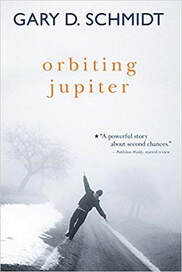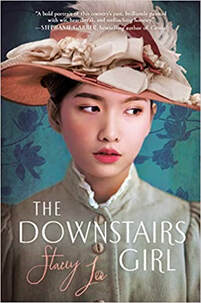I met Sarah Donovan several years ago at a then CEE conference, now ELATE. We found we had some common interests. We often found ourselves in the same places at NCTE. She ended up contributing at the 2018 and 2019 UNLV Summits on YA literature. I hope she continues to attend. She now will begin her career as an assistant professor of English Education at Oklahoma State University. I wish her well and I know that she will be fantastic.
I love her blog, Ethical ELA, and all the work and insight she has as a classroom teacher. I would have loved working with her as a colleague in a school. As it is, I love the opportunities that I have had and am having working with Sarah. I hope there are more projects in the future.
Day One: Setting the Scene for Lit-Rich Classroom by Sarah J. Donovan
Perhaps you begin with an ice breaker, maybe a survey of some sort. It is a common practice to fill out reading interest surveys if not on day one, in the first week: What is your favorite book? How many books are in your house? What genres do you prefer? What are your earliest memories of reading?
Reading surveys are shared with the best intentions -- to learn about our students -- but each question has implications:
- Questions about genre assume knowledge about genre and that the student has read a variety of literature.
- Questions about being a “good” reader may trigger memories of testing and Lexile labels.
- Questions about how many books a student reads in a year values speed and fluency and may set up a competitive environment.
- Questions about books at home or reading at home can shame students into hiding the truth as they may not have the means to buy books or even live in a home.
A First Day Conversation
What does it mean when we say: “I like this book?” or “This is a good book?”
A Re-Enactment
Students: [Awkward talk at tables as students realize that, yes, on day one we will talk to one another about books, and then the classroom gets louder as students realize they have lots to say about what is “good.” Some are playing up to what they think the teacher wants to hear -- plot, flashback, figurative language. Others are beautifully subversive, talking about farts or violence as being signs of a good book.]
Teacher: What if we talked about books not only as like or good but also appreciating what books have to offer. Is it possible to appreciate a book but not like it?
Students: [Talk with elbow partners. Some sharing out. A discussion ensues.One girl talks about a book that made her cry — she didn’t like it, but she appreciated that it moved her heart. Another reader says about a book a teacher made him read that he admits that it was written well, but it didn’t allow him to escape into the worlds of books he likes --Naruto, Rangers Apprentice. One student says that he first likes a book, and then, in re-reading, he comes to appreciate it. Teacher tries to get students to build on each other’s comments, asking names, making introductions.]
Teacher: Okay, so if you like a book, then you probably appreciate it, too. And you may not like a book but be able to find something to appreciate -- that a person actually wrote a book and got it published, that it has some good ideas about human beings, that there might be a good part or a non-cliche ending. Maybe it is not your genre. Maybe it is not a topic you like to think about. Still, it might be for someone else, and maybe you learned something. Let’s share some titles that you read in class or outside of class last year. Did you like it? If not, what might there be to appreciate, looking back at your younger self?
Students: [Talk to the other elbow partner. Teacher walks around out, nudging some thinking, helping recall titles. Teacher asks follow-up questions about genre, topic, theme, characters, human issues, etc. In these exchanges, teacher is also learning names and noticing how students already talk about books, engage with others.]
Teacher: Okay, let’s get into the books. Here is a book, Orbiting Jupiter by Gary Schmidt. Is there anything to appreciate about it before we even open it (cover, title, author, length, blurbs? Do you think you might “like” it? How do you know-- what is your gauge or personal criteria that you’ve developed over the years? What else do you need to know about it to decide?
Teacher: Page one: “Before you agree to have Joseph come live with you,” Mrs. Stroud said, “there are one or two things you ought to understand.” she took out a State of Main Department of Health and Human Service folder and laid it on the kitchen table.My mother look at me for a long time. Then she looked at my father. He put his hand on my back, “Jack should know what we’re getting into, same as us,” he said. He looked down at me. “Maybe you more than any one.” My mother nodded, and Mrs. Stroud opened the folder. This is what she told us. Okay, so what do you think? What questions do you ask yourself or another reader when you talk about a book?
Students: [Talk to neighbors. Share out. Teacher asks follow-up questions guiding toward some of the language they might use in class. Does it (the story) sound good? What’s the genre? Who is the narrator? Do you like him? What’s going on? Does the premise seem interesting? Is the writing style with dialogue and sort of short sentences something that suits you? Do you like short books?]
Teacher: How about this one -- The Downstairs Girl by Stacey Lee. Let’s take a look at the cover. What does the publisher want you to think this is about -- based on the cover?
Teacher: Page one: Being nice is like leaving your door wide open. Eventually, someone’s going to mosey in and steal your best hat. Me, I have only one hat and it is uglier than a smashed crow, so if someone stole it the joke would be on their head, literally. Still, boundaries must be set. Especially boundaries over worth. Today, I demand a raise. “You’re making that pavement twitchy the way you’re staring at it.” Robby Withers shines his smile on me. Ever since the traveling dentist who pulled Robby’s rotting molar told him he would lose more if he didn’t scrub his teeth regularly, he has brushed twice daily, and he expects me to do it, too. “Pavement is underappreciated for all it does to smooth the way, “I tell his laughing eyes, which are brown like eagle’s feathers, same as his skin. “We should be more grateful.” And now? What do you know? What are you wondering? Ask some questions.
Students: [Pose questions. Teacher asks follow-up questions but encourages classmates to talk to each other when responding. Is it what you thought? Who is the narrator? What’s going on? What about the way the character thinks and sees things? Notice the metaphor? Do you like a book with lots of metaphor? Can you appreciate it? Have you read other books like this? How does the first page fit with the cover or not?]
Teacher: The Downstairs Girl is set in 1890’s Atlanta. I skipped to the author’s note to learn a bit more about it before I read the book. The Chinese Exclusion Act was passed in 1882, a federal law that prohibited the immigration of Chines laborers until 1943. The Chinese already living in the U.S. could no longer bring their families from China. What is the genre of this book, then? Do you know much about the 1890s in America? Is it wrong that I read the author’s note before reading the story? Could you learn something by reading this book? Might you like it, too?
Students: [The students reassure the teacher that books are organized in different ways -- they are getting comfortable dropping knowledge -- but maybe the author would have put the note at the beginning if she wanted history to be first. Instead, the focus is on the female character on the first page -- the girl is the story. A debate may ensue here about how we read novels. Must we read in order? Can we skip around? Skim? Read the ending first? Who does that?]
Teacher: Okay, let’s line up according to our birth month -- quickly! [Students are startled but happy to move. They have to talk to one another to find out birthdays, which are so important at that age.) Now, with members of your birth-month group, pick up a few of the books scattered around. Introduce yourself to your classmates. Discuss the covers. Read the first page out loud. What questions emerge (narrator, identity, plot, symbols, genre)? What do you like? What is good? What is there to appreciate?
Students: [Teacher observes, listens. There is a lot to see and notice about personalities, interests, and book-enthusiasm/skepticism in what students say and don’t say, in how they move or don’t move, and in which books they choose or push aside. The classroom is a live with lit-rich chatter.]
Next 20 Minutes, Next Days, Weeks, Months
In the next 20 minutes of class, students will read. Some will read alone. Some will read together. Some will refuse.
And in the next days, you will share more books. Students will trade books. You will invite a conversation about all of that, and you will notice and learn about your students.
In the next weeks, you and your students will read. You might unpack the word “identity” and teach about intersectionality, or you might review characterization more traditionally. You might unpack genre and invite students to talk about how books are categorized and why.
In the following months, you will lead conferences with students about what they are reading. You may read a whole-class novel. You will read poems and news articles. You will assign reading responses and projects. You will find out if students have wi-fi at home, if or can students read at home, when they read to escape and when reading is therapy. You will find out if they play sports and/or have a following on YouTube or Insta. You will learn about their families. Books and their authors will help you start many important conversations.
I invite you to think through how your methods match your instructional goals and imagine how you can set up each class a lot like how you, as a reader, uncover and discover a book. You like, appreciate, and question. Reading is both personal and social. Past experiences with reading shape your relationship with reading, books, and other readers, too.
Resources
- “A Conversation on Liking and Appreciating Books”
- “9 Whole Weeks of Choice Reading”
- “One 9-Week Plan on Choice Reading in the Classroom (a Follow-Up)”
- “Easing into Choice Individual and Book Group Reading: A Progressive Approach”
- “Choosing Choice in Your English Classes this School Year: Books and Writing Projects for Self-Formation and Class Community”



 RSS Feed
RSS Feed